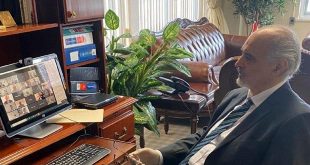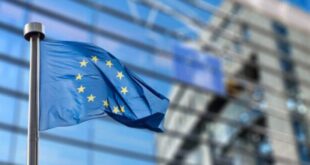Moscow, SANA-Bashar al-Jaafari, head of the Syrian government’s delegation to the second round of Moscow consultative meeting said the government’s assessment of the meeting is positive as the government’s delegation and those of the opposition sides made it through to a unified paper.
Speaking in a press conference on Friday, al-Jaafari said that the paper struck an important chord by tackling the Syrian people’s interests, providing an assessment of the dangers posed by terrorism and unifying the ranks of the Syrians in fighting it, as well as supporting the Syrian army and preserving the state’s institutions.
He said that common ground on a host of important issues was reached between the government’s delegation and the oppositions’.
He stated that the paper which was unanimously adopted on Friday is related to the first item only; adding that discussion of the second item was cut short because the negotiating sides did not have enough time.
An agreement about the second and third items was likely had it not been for the opposition’s attempts to buy time, he added.
He added that quite few had withdrawn their signatures because they did not dare say no when the document was adopted. “But they said what they said later because they wanted to play their dirty media tricks.”
He stated that fighting terrorism will be at the center of next meeting’s agenda.
“Moscow’s track is a consultative meeting between the Syrians that has no international dimensions,” al-Jaafari said, indicating that the UN envoy Staffan de Mistura “represents the international dimension” which he considered incompatible with the Russian framework for the meeting as supposedly being purely inter-Syrian.
Al-Jaafari described Russian side as ” independent and neutral” whose role is confined to being a facilitator, indicating that some sides sought to abort the meetings in Moscow.
Syria’s staunchest foes came to acknowledge the terrorism of ISIS, Jabhat al-Nusra and other terrorist organizations, admitting that the Syrian government has a serious and key role in fighting terrorism, he added.
The same countries that have denied the presence of terrorism in Syria now claim to be fighting it, al-Jaafari said, reminding that it was the US which founded the “Coalition” to fight terrorism that they have always accused the Syrian government of fostering.
He added that the Syrian government has the right to enlist the support of friends in the battle against terrorism which he said is legitimate, thanking the Russian government for the facilitations it provided for the meeting to be a success.
“But the terror organizations which are sponsored by foreign agendas and funded by the dirty money of the Gulf are illegitimate,” al-Jaafari added, affirming that the fight against terrorism is not a Syrian issue only.
He said that the opposition is usually referred to in the plural as they call themselves, which signifies sharp disagreements between the opposition groups that was in full display during the meetings, a matter that delayed reaching a common ground.
Al-Jaafari criticized the call of some sides to the UN Secretary-General and the UN Security Council, considering it “irrelevant and irresponsible.”
Al-Jaafari said the flurry of visits by tens of Western delegations to Damascus and the talk about reopening embassies augurs well as it indicates that the international community is revising its policies towards Syria.
Though acknowledging the gravity of dangers in Syria and the region, al-Jaafari downplayed the likelihood of a military strike against Syria.
“If they were capable [of a military strike], they would have done it since the start of the crisis,” he added.
Al-Jaafari warned of a major plan intended to pit Arab states against each other and undermine the Arab armies in service of Israel.
Manar al-Frieh/Manal Ismael
 Syrian Arab News Agency S A N A
Syrian Arab News Agency S A N A




